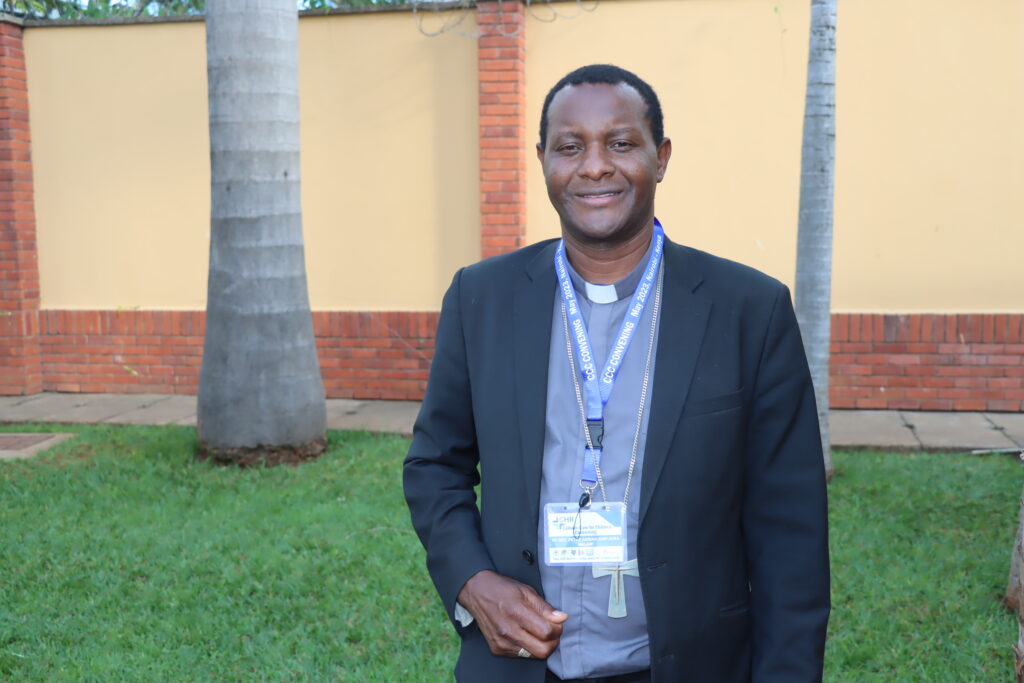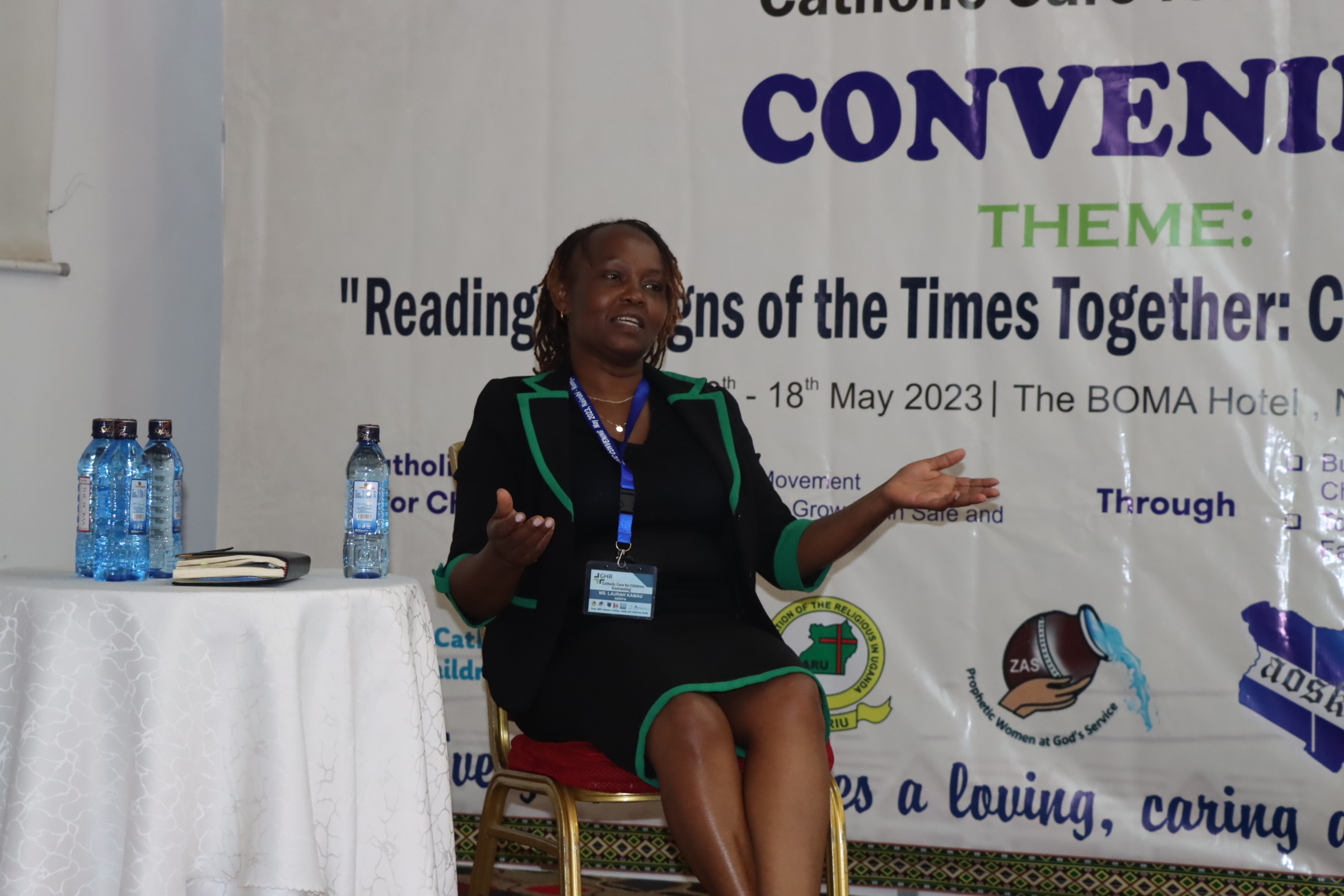AMECEA/CCC: Participants at Catholic Care for Children Empowered to Enlighten Society on Care Reforms

Bishop Peter Adrian Chilufya of Dedza Diocese Malawi
Sr. Jecinter Antoinette Okoth, FSSA
At the end of the three-day conference shading light on the possibility of care reforms so children can receive family and community-based care, the participants are enthusiastic to empower others towards realization of this dream.
In an interview with AMECEA online just after the closure of the sessions on Thursday, May 18, Bishop Peter Adrian Chifukwa of Dedza Diocese, Malawi appreciated the convening saying, “When I go back to my diocese with this new concept, I will take the lead to create awareness to various clergy, catechists the laity and congregations in this ministry that we may slowly on start this concept through common approach that all children in institutions should be considered for reintegration in their families.”
The Malawian Prelate acknowledged that all through the Church’s ministry towards the abandoned and orphans’ children has been to institutionalize them. Actually, this has been the best approach to save these children and some of whom, efforts have been made to reintegrate them into communities and families.”
He continued, “But now after several studies that have been conducted, it comes out that the best way to care for the children is for them to be in communities and families. This is a new concept and I have seen a lot of sense in it since an individual grows best in a family or community.”
The Church leader encouraged collaboration with other stakeholders stressing that together the dream is achievable.
“As it has been shared from the discussions, I will work with other partners especially the government on the guidelines that they have so far and then approach community leaders on this global approach, so they need to be aware that it is their responsibility to help children grow up in their families and community,” Bishop Chifukwa said adding that, “We will move together with the Church in Malawi and in AMECEA (Association of Member Episcopal Conferences in Eastern Africa) to interact on the lessons and experiences from this process.”
Even though the idea on care reforms has been welcome, the Bishop highlighted that some families have a lot of challenges and need a lot of support.
“I am aware of families with heavy burden. In this case, we will try to have programs to help these families. We are also aware that families are slowly breaking down and there is need to device ways for families not to leave children to be alone even in the homes because of parents’ commitments.”
“As I create awareness to the Christians, I will ask them to identify families that are overwhelmed with this task so these families can be provided some accompaniment that even though they have a lot of burden, it is still their responsibility to ensure the children grow up in those families.”

On her part the grants manager supporting work in child’s protection with Porticus Ms. Laurah Kamau, emphasised that the conference was an eye opener and “Care reforms is possible.”
She confessed that from attending an earlier seminar on a similar concern, she wondered the reality of advocating for care reforms and what might happen to children’s institutions once the children are transitioned.
“From this workshop I have realised that care reform is possible,” she said.
Ms. Kamau appreciated the work done by Religious sisters in terms of transitioning children from institutions to their families and the being concerned of the underlying aspect on child safe guarding which the sisters have done “through development of policies and training.”
She also encouraged collaboration with other partners saying, “We have seen the tremendous support from the government in terms of positive legal frameworks supporting the care reforms, we have also seen the support of the Church from the very highest-level with the Bishops’ conferences and AMECEA playing a critical role as a region and this partnership should be strengthened. “
Ms. Kamau highlighted the key challenge of poverty which is affecting families noting that “This brings the worry of what will happen to the children when they go back to their families.”
Another participant from Catholic Care of Children (CCC) from Sri Lanka Mr. Morrid Perera disclosed their appreciation for the initiative and that Five congregations are already attached to CCC-Sri Lanka working for reintegration and reformation of children.
“Since the process has begun in one country, we believe it will work out in Sri Lanka and other countries as well,” Mr. Perera the Manager at CCC Sri Lanka said.
He underscored that since the convening has stressed on family strengthening as the main focus for successful reintegration process, “as a strategy, we will use Small Christian Communities which in our case is Asian Christian communities as one of the models to reach families.”

Besides he explained, “we have also to think of other sectors that is through health and education how to reach families.”
Talking about collaboration, Mr. Perera who joined the CCC program about three months ago supported the idea saying that “We have been working as individual stakeholders and now we are ready to come together and work in collaboration especially in family strengthening.”
The three-day workshop that was held in Kenya’s capital Nairobi from 16-18, May was themed: Reading the signs of time together: Catholic Care for Children.


